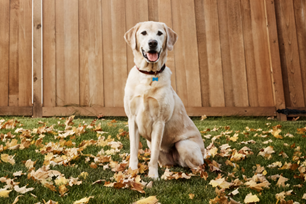Fall allergies are nothing to sneeze at
As the days get shorter and preparations begin for the winter ahead, there are a few things to be aware of that can be dangerous for your pets. Keep them safe by learning about some common risks of the season.
- Mothballs: No one wants moths overwintering in their closets. But using mothballs as a repellent can be dangerous as they contain chemicals which are toxic to pets if ingested. Instead, you can make (or buy) a sachet with cedar chips, lavender or cloves to repel moths in your closets.
- Rodenticides: As the days get cooler and shorter, rodents like to find a cozy, dry spot to spend the winter. Avoid storing rodent attractants such as grass seed, pet food, bird seed, etc. in sheds or garages. Because rodents have a keen sense of smell and are repelled by the strong scent of dryer sheets, try tucking some on shelves, out of reach of curious pets to help keep the rodents out. If using rodenticides, work with professional exterminators and use pet-proof bait stations Accidental ingestion of rodenticides can be fatal. If you suspect accidental ingestion, contact your veterinarian immediately.
- Antifreeze: Wipe up drips immediately and keep your pets in a secure location when using antifreeze. If your pet has consumed even a tiny amount of antifreeze, seek immediate veterinary care.
- Hunting: Fall means hunting in many areas across the US, so avoid walking your dog in areas where hunting is popular. If you do head out into the woods, be sure that both you and your dog are wearing the color blaze orange, so you’re visible to hunters.
- Leptospirosis: Leptospirosis is a disease caused by infection with Leptospira bacteria, which live in moist soil or stagnant water. Leptospirosis is most common in the rainy fall season and dogs can become infected if they come into contact with urine-contaminated soil, water, food or bedding. The disease is carried by raccoons, rodents, and possums, and can occur in cities and suburbs – not just in rural areas! Luckily, it’s preventable. Get your pet vaccinated so they’re protected this season.
- Parasites: Parasites like fleas and ticks don’t disappear in the fall! They continue to be active and feed on pets right through the fall, and ticks are active even on warm winter days. Keep your pet protected with year-round flea and tick preventives.
- Fall veggies: The fall harvest is in full gear, so be mindful of where you’re storing vegetables that are toxic to pets, such as onions and garlic. Use an onion box kept in a cool dark place, such as your cellar to protect your pets from an accidental poisoning.
- Halloween candies: As Halloween approaches, hide the treats in out-of-reach places. Chocolate is toxic and many candies and gum contain the artificial sweetener xylitol, which is also very dangerous for pets.
- Mushrooms: With rainy fall comes mushrooms. Some wild mushrooms are extremely toxic and even mushroom experts have a hard time telling them apart. Keep your pet away from mushrooms, and if they ingest some, contact your veterinarian right away. If possible, collect a specimen of the mushroom to show your veterinarian.
Shop your pet's must-have products, delivered right to your door. >>
